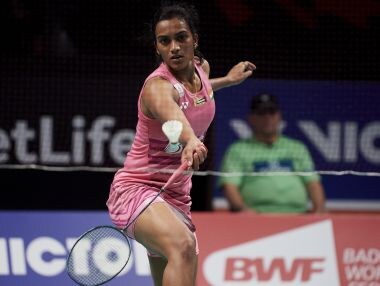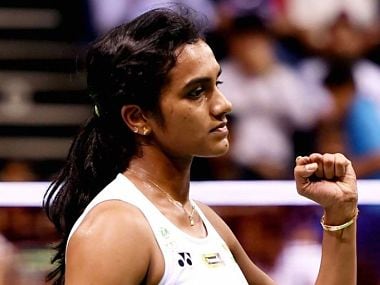The supporter of Indian badminton would like to think that the lead singles between PV Sindhu and Akane Yamaguchi in the India-Japan Asia Team Badminton Championships Group ‘W’ clash in Alor Setar on Thursday was played in all seriousness, and not with the light-heartedness that induced the Indians to field doubles specialist Ashwini Ponnappa in the third singles.
Since both teams had already qualified for Friday’s play-off quarter-finals, they could afford to let their guard down, and not really bother about the eventual result. In the event, the powerful Japanese squad notched up a 4-1 win, with India’s consolation point coming from World No 4 (as in the latest BWF rankings), Sindhu’s 21-19, 21-15 victory over the World No 2 from Katsuyama city in the Fukui prefecture.
The badminton aficionado was left with the distinct impression that the needle was missing from the encounter, and that both players played well within themselves, Sindhu perhaps less so. The duel went along the same lines as their inconsequential last group clash in the 2017 year-ending Superseries Finals in Dubai, when both players had already qualified for the semi-finals. Yamaguchi had put up only a lukewarm show and allowed Sindhu to wrap up the match easily.

File photo of PV Sindhu India in action. AFP
It was a totally different matter when the two clashed again in the final, with the title at stake. The 20-year-old Japanese had fought tooth and nail, coming from behind to take the crown and the substantial winner’s cheque with a 22-20 decision in the third and deciding game. Hence, not too much can be read into Yamaguchi’s relatively meek surrender to Sindhu at the Sultan Abdul Halim Stadium on Thursday.
There were no such favours granted to the rest of the Indian squad, as tall left-hander Sayaka Sato, standing in for the rested Nozomi Okuhara, administered a 26-minute 21-12, 21-12 pummelling to Sri Krishna Priya Kudaravalli, and Aya Ohori treated Ponnappa in much the same way while winning 21-14, 21-12 in exactly the same amount of time.
Nor did the two Indian doubles combinations fare any better. The top duo of Ponnappa and N Sikki Reddy found the World No 1 pairing of Ayaka Takahashi and Misaki Matsutomo just a little too hot to handle, and lost at 21-18, 21-18 after 41 minutes of lengthy rallies while trying to break down the impregnable Japanese defence. Sanyogita Ghorpade and Prajakta Sawant also went down to Shiho Tanaka and Koharu Yonemoto by a 21-17, 21-17 scoreline in two minutes over the half-hour mark.
Late in the night, when the draws for the quarter-finals were made, it was determined that India would play Indonesia, who had ended second-best to China in Group ‘Z’, with a close 2-3 loss in action that once again reeked of being a friendly practice session, since both teams had already qualified for the last-eight stage.
The Indians were left with a fighting chance of making the last-four at the expense of the Indonesians, thereby ensuring a bronze medal for themselves. Sindhu is unlikely to have much difficulty against Fitriani Fitriani, whom she has beaten thrice in the past, without reply.
It will be up to one of the other two Indian singles players, Kudaravalli and probably Ruthvika Shivani Gadde, to pull out a vital singles point, for the top Indian doubles combination of Ponnappa and Sikki Reddy will be hard put to it to score over the powerful Indonesian duo of Greysia Polii and Apriyani Rahayu, the latter having replaced Nitya Krishinda Maheswari in that combination in mid-2017.
Ponnappa and Sikki Reddy would have stood a better chance of defeating the second Indonesian pair of Anggia Shitta Awanda and Ni Ketut Mahadewi Istarani, but the rules of the competition dictate that the order of play must be in accordance with the players’ BWF ranking, with the top-ranked players clashing against their counterparts in the other team.
As for the Indian men, they progressed through to the quarter-finals, despite losing their final inconsequential Group ‘D’ match to Indonesia by a 2-3 margin. In a competition that is staged as the Asian zone qualifier for the Thomas and Uber Cup team championships, later this year, India have a projected Friday evening meeting with China.
Again, not much could be read into the defeat against Indonesia, since India fielded doubles specialist B Sumeeth Reddy in the third singles, and suffered the consequences, with Reddy going down meekly to Ihsan Maulana Mustofa at 21-12, 21-7, after tie scores had been deadlocked at 2-2 at the end of the fourth match.
There was one plus that the Indians could take away from their encounter with the Indonesians – the superb comeback 18-21, 21-18, 24-22 victory by young Satwiksairaj Rankireddy and Chirag Shetty over Kevin Sanjaya Sukamuljo and Mohammad Ahsan. The Indonesians opted to rest Marcus Fernaldi Gideon from their top-ranking doubles combination, and fielded the ageing 30-year-old Ahsan; and it gave the youthful Indians just that tiny opening to score a morale-boosting win.
The doubles win was, however, offset by a 35-minute 21-17, 21-17 reverse suffered by the lead Indian singles player, Kidambi Srikanth, at the hands of Jonatan Christie, against whom he was leading 2-1 in head-to-head meetings, having won in straight games on the last two occasions that they had clashed, in 2016 and last year.
In view of Srikanth’s somewhat indifferent form since the Indian Nationals in mid-November, exacerbated by the knee niggle he had suffered in the final stages of the French Open at end-October, it would have been a fine opportunity to test his match readiness against the 20-year-old Indonesian, ranked 13th on the BWF computer. But perhaps, he was saving himself for the sterner test ahead against China.
There were no such alarms from B Sai Praneeth, as he played his usual smooth game to pip Anthony Sinisuka Ginting at 21-18, 21-19. The 21-year-old Ginting, ranked ninth in the world, had distinguished himself recently by winning his first World Tour title at the Indonesia Masters, but he ended up falling 1-2 behind in career meetings with Praneeth, after having narrowly lost their encounter at the 2017 World Championships in Glasgow.
The second Indian doubles pair of Shlok Ramchandran and M R Arjun, who will probably have played their last match in the Asia Team Championships, since two higher-ranked pairs will return for the tie against China, flattered to deceive against Angga Pratama and Rian Agung Saputro. They stormed through the first game, but then faded gradually away, to lose at 21-14, 16-21, 12-21. Nevertheless, it would have been a great experience for the lads.
India will have a fantastic chance of upstaging the Chinese, who are playing this tournament without the services of their top singles stars, Lin Dan and Chen Long, who have seven world championship titles and three Olympic gold medals between them. China have also dropped their top two doubles combinations for this event.
The Chinese have taken this step of leading their challenge with the untried 21-year-old Shi Yuqi, because they are certain to qualify for the Thomas Cup on the strength of their team ranking, even if they fail to get beyond the quarter-final in this competition.
It gives their second string players a rare opportunity of playing against the best on the continent in team competition. But it also gives their rivals a chance of getting their names into the record-books as conquerors of the world’s top badminton nation.
Published Date: Feb 09, 2018 09:10 AM | Updated Date: Feb 09, 2018 09:18 AM




















